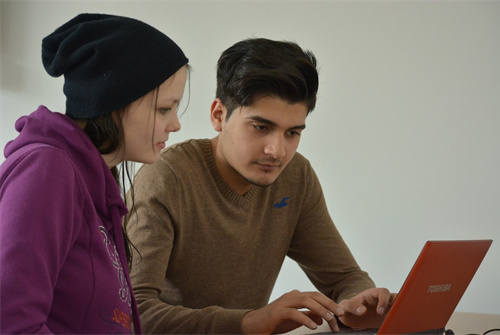【简介】感谢网友“17285”参与投稿,这里小编给大家分享一些,方便大家学习。
【第1句】:谁有人教版七年级下册的重点单词和句子
人教版新目标英语七年级(下)各单元知识概要 Unit 1 Where's your pen pal from? 【第1句】:词组 be from= come form 来自。
pen pal=pen friend 笔友 like and dislike 好恶;爱憎 live in….在。居住 speak English 讲英语 play sports 做体育运动 a little French 一些法语 go to the movies 去看电影 an action movie 一部动作片 on weekends 在周末 Excuse me 对不起,打扰 get to 到达、抵达 beginning of 在。
开始的时候 at the end of 在。结束的时候 arrive at / 【第2句】:句型 (1)、Where主 +be+主语+from? 主语+be+from+地点. (2)、Where do/does+主语+live? 主语+live/lives in… (3)、What language do/does +主语+speak? 主语+speak/speaks…. (4)、主语+like/likes+doing… 【第3句】:日常交际用语 1-Where is your pen pal from? -He's from China. 2-Where does she live? --She lives in Tokyo. 3-Does she speak English? -Yes,she does/No,she dosen't. 4-Is that your new pen pal? -Yes,he is /No,he isn't. 5-What language does she speak? -She speaks English. Unit 2 Where's the post office 【第1句】:词组 post office 邮局 pay phone 投币式公用电话 next to 在。
隔壁 across from 在。对面 in front of 在。
前面 between…and… 在。和。
之间 on a street 在街上 in the neighborhood 在附近 on the right/left 在右边/在左边 on one's right/left 在某人的右边/左边 turn right/left 向右/左转 take a walk 散步 have fun 玩得开心 the way to …去。的路 take a taxi 打的/乘出租车 go down(along)…沿着。
走 go through。穿过。
have a good trip 旅途愉快 【第2句】:句型 (1)、Is there a bank near here? Yes,there is .It's on Centre Street. No,there isn't. (2)、Where's the sumpermarket? It's next to the library. (3)、Bridge Street is a good place to have fun. (4)、I hope you have a good trip. (5)、If you are hungry,you can buy food in the restaurant. (6)、Talk a walk though the park.. (7)、enjoy后接名词或动词-ing形式. Do you enoy(=like) your work? Do you enjoy(=like) living in the city? 【第3句】:日常交际用语 (1)、Is there a ….?句型Eg: -Excuse me.Is there a hotel in the neighborhood. -Yes, there is. No.there isn't (2)、Where is …?句型Eg: -Where is the park,please? -It's behind the bank.(肯定回答) -I'm sorry I don't know. (否定回答) (3)、Which is the way to +地点? 句型.例如: - Which is the way to the library. (4)、How can I get to +地点?句型.例如: -How can I get to the restaurant? (5)、Can you tell me the way to +地点?句型.例 - Can you tell me the way to the post office? (6)、Let me tell you the way to my house. (7)、Just go straight and turn left. Unit 3 Why do you like koalas? 【第1句】:词组 want to do sth .想要做某事 want sb to do sth 想要某做某事 want sth 想要某物 Let sb do sth 让某人做某事 kind of 有几分种类 a kind of 一种… …years old …年龄 如:ten years old 十岁 like to do sth 喜欢做某事 like doing sth play with … 与。一起玩 be quiet 安静 during the day 在白天 at night 在夜间 have a look at.. 看。
one…the other 一个。另一个。
【第2句】:句型 (1)、-why do you like pandas? -Because they're very cure. (2)、-Why dose he like koalas? -Because they are kind of interesting. (3)、-Where are lions from? -Lions are from South Africa. (4)、-What animals do you like? -I like elephants. 【第3句】:日常交际用语 (1)、-Let's see the lions. (2)-Why do you want to see the lions? -Becase they are very cute. (3)-Do you like giraffes? Yes,I do./ No,I don't (4)-What other animal do you like? _I like dogs.too other+ 名词的复数.表示没有特定的数量范围 the other+名词的复数表示有特定的数量范围. (5)-Why are you looking at me? -Because you are very cute. (6)-Let us play games. –Great! Let me see. Unit 4 I want to be an actor. 【第1句】:词组 want to be+职业 想要成为。
shop assistant 店员 bank clerk 银行职员 work with 与。
一起工作 work hard 努力工作 work for 为。
而工作 work as 作为。
而工作 get.. from…从。
获得。
give sth.to.sb /give.sb.sth 把某物给某人 正确的表示:give it/them to sb. 错误的表示:give sb.it/them in the day 在白天 at night 在夜间 talk to /with 与…讲话 go out to dinners 外出吃饭 in a hospital 在医院 newspaper reporter 报社记者 movie actor 电影演员 【第2句】:句型 (1)-What do/does+某人+do? 例:-What do you do?-I'm a student. -What dose he do? He's a teacher. (2)-What do/does+某人+want to be? 例:What do you want to be?-I want to be a teacher. -What does she want to be ?She want to be a nuser. (3)-Where does your sister work? -She works in a hospital. (4)-Does he work in the hospiat Yes.he does/No,he doesn't (5)-Does she work late? -Yes,she does/No.she doesn't (6)-英语中询问职业的几种表达方式: What do/does …do? What is…? What is your father? What's one's job?例:What's your father's job? Unit 5 I'm watching TV. 一。
【第2句】:七下英语重点句子
七年级下册英语重点短语:
. a bottle of
【第2句】: a little
【第3句】: a lot (of)
【第4句】: all day
【第5句】: be from
【第6句】: be over
【第7句】: come back
【第8句】: come from
【第9句】: do one's homework
【第10句】: do the shopping
【第11句】: get down
【第12句】: get home
【第13句】: get to
【第14句】: get up
【第15句】: go shopping
【第16句】: have a drink of
【第17句】: have a look
【第18句】: have breakfast
【第19句】: have lunch
【第20句】: have supper
【第21句】: listen to
【第22句】: not…at all
【第23句】: put…away
【第24句】: take off
【第25句】: throw it like that
【第26句】: would like
【第27句】: in the middle of the day
【第28句】: in the morning / afternoon/ evening
【第29句】: on a farm
【第30句】: in a factory
七年级下册英语重点句型:
【第1句】: Let sb. do sth.
【第2句】: Could sb. do sth.?
【第3句】: would like sth.
【第4句】: would like to do sth.
【第5句】: What about something to eat?
【第6句】: How do you spell …?
【第7句】: May I borrow…?
【第3句】:谁有七年级下英语重点单词和句子(人教版)
like to do sth 喜欢做某事
stop doing sth 停止做某事
stop to do sth 停住去做某事
love doing sth
love to do sth
have fun doing sth 对什么事情感觉有趣
find sb doing sth 找到什么人在做什么事
help sb (to) do sth 帮助某人做某事
ask sb sbout sth 问某人关于什么事
show sb sth 表演给某人什么事; show sth to sb 表演什么事给某人
enjoy doing sth 喜欢做某事
would like to do sth 想要做某事
go to 。 to do sth 去哪里做某事
上课不听。问jio jio也一样的啊..分给我了那·真是的..我对你多好..把书上的全朝下来了
help sb (to) do sth 帮助某人做某事 like to do sth ;like doing sth 喜欢做某事 love to do sth ;love doing sth 爱做某事 enjoy doing sth 喜欢做某事 go to 。to do sth 去..,做某事 would like to do sth 想要做某事 show sb sth;show sth to sb 表演某人某事;表演某事给某人 have fun doing sth 做某事很有趣 find sb doing sth 找到某人做某事 stop doing sth 停止做某事 stop to do sth 停止去做某事 look at sb doing sth 看到某人做某事
【第4句】:谁有人教版七年级下册的重点单词和句子
人教版新目标英语七年级(下)各单元知识概要 Unit 1 Where's your pen pal from? 【第1句】:词组 be from= come form 来自。
pen pal=pen friend 笔友 like and dislike 好恶;爱憎 live in….在。居住 speak English 讲英语 play sports 做体育运动 a little French 一些法语 go to the movies 去看电影 an action movie 一部动作片 on weekends 在周末 Excuse me 对不起,打扰 get to 到达、抵达 beginning of 在。
开始的时候 at the end of 在。结束的时候 arrive at / 【第2句】:句型 (1)、Where主 +be+主语+from? 主语+be+from+地点. (2)、Where do/does+主语+live? 主语+live/lives in… (3)、What language do/does +主语+speak? 主语+speak/speaks…. (4)、主语+like/likes+doing… 【第3句】:日常交际用语 1-Where is your pen pal from? -He's from China. 2-Where does she live? --She lives in Tokyo. 3-Does she speak English? -Yes,she does/No,she dosen't. 4-Is that your new pen pal? -Yes,he is /No,he isn't. 5-What language does she speak? -She speaks English. Unit 2 Where's the post office 【第1句】:词组 post office 邮局 pay phone 投币式公用电话 next to 在。
隔壁 across from 在。对面 in front of 在。
前面 between…and… 在。和。
之间 on a street 在街上 in the neighborhood 在附近 on the right/left 在右边/在左边 on one's right/left 在某人的右边/左边 turn right/left 向右/左转 take a walk 散步 have fun 玩得开心 the way to …去。的路 take a taxi 打的/乘出租车 go down(along)…沿着。
走 go through。穿过。
have a good trip 旅途愉快 【第2句】:句型 (1)、Is there a bank near here? Yes,there is .It's on Centre Street. No,there isn't. (2)、Where's the sumpermarket? It's next to the library. (3)、Bridge Street is a good place to have fun. (4)、I hope you have a good trip. (5)、If you are hungry,you can buy food in the restaurant. (6)、Talk a walk though the park.. (7)、enjoy后接名词或动词-ing形式. Do you enoy(=like) your work? Do you enjoy(=like) living in the city? 【第3句】:日常交际用语 (1)、Is there a ….?句型Eg: -Excuse me.Is there a hotel in the neighborhood. -Yes, there is. No.there isn't (2)、Where is …?句型Eg: -Where is the park,please? -It's behind the bank.(肯定回答) -I'm sorry I don't know. (否定回答) (3)、Which is the way to +地点? 句型.例如: - Which is the way to the library. (4)、How can I get to +地点?句型.例如: -How can I get to the restaurant? (5)、Can you tell me the way to +地点?句型.例 - Can you tell me the way to the post office? (6)、Let me tell you the way to my house. (7)、Just go straight and turn left. Unit 3 Why do you like koalas? 【第1句】:词组 want to do sth .想要做某事 want sb to do sth 想要某做某事 want sth 想要某物 Let sb do sth 让某人做某事 kind of 有几分种类 a kind of 一种… …years old …年龄 如:ten years old 十岁 like to do sth 喜欢做某事 like doing sth play with … 与。一起玩 be quiet 安静 during the day 在白天 at night 在夜间 have a look at.. 看。
one…the other 一个。另一个。
【第2句】:句型 (1)、-why do you like pandas? -Because they're very cure. (2)、-Why dose he like koalas? -Because they are kind of interesting. (3)、-Where are lions from? -Lions are from South Africa. (4)、-What animals do you like? -I like elephants. 【第3句】:日常交际用语 (1)、-Let's see the lions. (2)-Why do you want to see the lions? -Becase they are very cute. (3)-Do you like giraffes? Yes,I do./ No,I don't (4)-What other animal do you like? _I like dogs.too other+ 名词的复数.表示没有特定的数量范围 the other+名词的复数表示有特定的数量范围. (5)-Why are you looking at me? -Because you are very cute. (6)-Let us play games. –Great! Let me see. Unit 4 I want to be an actor. 【第1句】:词组 want to be+职业 想要成为。
shop assistant 店员 bank clerk 银行职员 work with 与。
一起工作 work hard 努力工作 work for 为。
而工作 work as 作为。
而工作 get.. from…从。
获得。
give sth.to.sb /give.sb.sth 把某物给某人 正确的表示:give it/them to sb. 错误的表示:give sb.it/them in the day 在白天 at night 在夜间 talk to /with 与…讲话 go out to dinners 外出吃饭 in a hospital 在医院 newspaper reporter 报社记者 movie actor 电影演员 【第2句】:句型 (1)-What do/does+某人+do? 例:-What do you do?-I'm a student. -What dose he do? He's a teacher. (2)-What do/does+某人+want to be? 例:What do you want to be?-I want to be a teacher. -What does she want to be ?She want to be a nuser. (3)-Where does your sister work? -She works in a hospital. (4)-Does he work in the hospiat Yes.he does/No,he doesn't (5)-Does she work late? -Yes,she does/No.she doesn't (6)-英语中询问职业的几种表达方式: What do/does …do? What is…? What is your fat。
【第5句】:七年级英语下册重点句子
【第1句】:Where are you pen pal from?/Where do you pen pal come from? 【第2句】:What language does he/she speak ? He/She speak french. 【第3句】:I live in Toronto Canada. 【第4句】:I want a pen pal in china. 【第5句】:I like going to the movies with my friends. 【第6句】:Please write and tell me about your own situation. 【第7句】:It is too difficult. 【第8句】:I play soccer on weekends 【第9句】:I think China is a very interesting country. 【第10句】:I can speak English and a little chinese. 【第11句】:I can speak English and a little Japanese.。
【第6句】:七年级下册英语1
第十二单元的:unit 12 don't eat in class. 一.短语. 【第1句】: in class 在课上 【第2句】: on school nights 在上学的晚上 【第3句】: school rules 学校规章制度 break the rules 违反规章制度 【第4句】: no talking 禁止交谈 【第5句】: listen to music 听音乐 【第6句】: have to 不得不 【第7句】: take my dog for a walk 带狗去散步 【第8句】: eat outside 在外面吃饭 【第9句】: in the hallway 在走廊上 【第10句】: wear a uniform 穿制服 【第11句】: arrive late for class 上学迟到 【第12句】: after school 放学后 【第17句】: be in bed 在床上 【第13句】: practice the guitar 练习弹吉它 【第14句】: in the cafeteria 在自助食堂里 【第15句】: meet my friends 和我朋友见面 【第16句】: by ten o'clock.十点之前 【第18句】: the children's palace 少年宫 【第19句】: help my mom make dinner 帮助我妈做饭 【第20句】: in the hallways 在过道 二.重点句型 【第1句】:don't arrive late for school=don't be late for school 【第2句】:don't fight 【第3句】:don't listen to music in the classroom. 【第4句】:don't run in the hallways 【第5句】:don't smoke .it's bad for your health. 【第6句】:don't play cards in school 【第7句】:don't talk in class 【第8句】:don't watch tv on school nights. 【第9句】:don't sleep in class. 【第10句】:don't play sports in the classrooms. 【第11句】:don't sing songs at night. 【第12句】:don't talk when you eat. 【第13句】:don't wear hats in class. 【第14句】:do homework by 10:00. 【第15句】:clean your house! 【第16句】:make the bed. 【第17句】:can we ……? yes ,we can . no, we can't. 【第18句】:do you have to wash your clothes? yes, i do./no, i don't. 三. 重难点解析: 【第1句】: 情态动词have to 的用法,意思是"必须、不得不"。
(1)结构:主语+have to+动词原形+其他 (一般现在时,主语是第三人称单数时,用has to;句子是过去时,用had to.)如: we have to wear sneakers for gym class. 在体育课上,我们必须穿运动鞋。tom has to practice the guitar every day. 汤姆每天必须练习弹吉它。
i had to get up at 5:00 am last monday. 上周一,我不得不早上5点起床。 (2)否定形式:主语+don't have to+动词原形+其他 (一般现在时,主语是第三人称单数时,用doesn't have to. 句子是过去时,用didn't have to) nick doesn't have to wear a uniform. 尼克不必穿制服。
we didn't have to do our homework at once. 我们不必马上完成作业。 (3)疑问句:do (does或did)+主语+have to +动词原形+其他 如:do you have to stay at home on weekends? 周末你必须呆在家里吗?yes, i do. / no, i don't. 是的,我必须。
不,我不必。did he have to go to bed by 11:00 last night? 昨晚,他不得不11点前上床睡觉吗? 【第2句】: 情态动词can的用法 (1)表示能力,"会""能"(在第一册中已经学习这种用法) can you play the guitar? 你会弹吉它吗? can在否定句中,直接在can后加上not,在疑问句中,把can放到主语前面,并且没有人称和数的变化。
【第5句】: arrive late for 与be late for 意思相近," 【第6句】: no talking ! "禁止交谈!"no后面加上名词或动名词(doing)也表示不要做某事。与don't +do的用法相似。
no wet umbrellas! / don't put wet umbrellas here! 禁止放湿雨伞! no food! don't eat food here! 禁止吃食物!no smoking! don't smoke here! 禁止吸烟! 【第7句】:语法(祈使句) 祈使句是用来表示请求、命令、叮嘱、号召或者劝告等的句子,这类句子的主语常是第二人称you,也就是听话者,因而you常省去了。祈使句的开头是动词原形。
1)be型(即系动词原型be+表语+其他)。 如:be quiet,please.否定句don't + be+表语+其他。
如:don't be angry. 2)do型(即系动词原形+宾语+其他)。如: open you books,please.否定句don't +实义动词原形+宾语+其他。
如:don't eat in the classroom. 3)let型(即let+宾语+动词原形+其他)如: let me help you.let's go at six o'clock. 否定句一般在宾语后加not。如: let' not watch tv. 4)no+v-ing型(此种形式通常用于公共场合的提示语中,意为“禁止做某事“)如: no smoking! 严禁吸烟!no talking! 不许交谈!no passing! 禁止通行!no parking! 不许停车。
【第7句】:新目标七年级下册重点单词和句型
七年级英语下册第1-2单元重点短语集锦 【第1句】: be/come from来自 【第2句】: a little / a bit of 一点(修饰不可数名词) 【第3句】: like doing sth/like to do sth 喜欢做某事(前者强调习惯,后者强调一次性) 【第4句】: write to sb 给某人写信 【第5句】: tell sb about sth 告诉某人关于某事 【第6句】: on weekends 在周末 【第7句】: go to the movies 去看电影 【第8句】: live in 居住在 【第9句】: speak English 说英语 【第10句】: in October 在十月(在日期和表示星期几的词前用on, 在日期或者星期几的上午、下午或者晚上用on,在某年、某月、某季节前用in,在某个时刻前用at) 【第11句】: post office 邮局 【第12句】: pay phone 投币式公用电话 【第13句】: on Center Street 在中心街 【第14句】: near here=in the neighborhood 在附近 【第15句】: across from 在……对面 【第16句】: next to 在旁边 【第17句】: in front of 在……前面 【第18句】: between…and… 在……和……之间 【第19句】: turn left/right 向左(右)转 【第20句】: on the left/right 在左(右)边 【第21句】: take a walk = have a walk = go for a walk 散步 【第22句】: have fun = have a good time 玩得高兴 【第23句】: take a taxi 乘出租车 【第24句】: have a good trip 旅途愉快 【第25句】: go down/along 沿着……向前走 【第26句】: go through 穿过 【第27句】: the way to 去……的路 【第28句】: next Sunday下个星期天 【第29句】: on your left/right 在你的左(右)边 【第30句】: welcome to 欢迎来到 【第31句】: the beginning of 在……的开始 【第31句】: pen pal 笔友 【第32句】: the United States 美国 【第32句】: the United Kingdom 英国 练习题:用适当的介词填入下列空格中。
【第1句】: _____ Sundays we often stay ________ home. 【第2句】: He is__________ Australia. He speaks English. 【第3句】: Bob lives _______ Toronto, Canada. 【第4句】: Monday is the beginning ________ a week. 【第5句】: ______ the evening of May 1st, I visited my uncle. 【第6句】: There are many people ________ Chang'an Street every day. 【第7句】: Does your sister write ________ you every month? 【第8句】: Please tell me ________ yourself. 【第9句】: ________ weekends, I often play computer games. 【第10句】: Excuse me, could you tell me the way _______ Mianzhu Library? 【第11句】: There were many trees _____ the neighborhood one year ago. 七年级英语下册第3-4单元重点短语集锦 【第1句】: let sb do sth 让某人做某事 【第2句】: kind of 有几分 【第3句】: at night 在晚上 【第4句】: South Africa 南非 【第5句】: play with 和……玩 【第6句】: shop assistant 店员 【第7句】: bank clerk 银行职员 【第8句】: TV/ police station 电视台/警察局 【第9句】: work with 和……工作 【第10句】: work for 为……工作 【第11句】: work hard 努力工作(学习) 【第12句】: get…from…从……得到…… 【第13句】: give sb sth=give sth to sb把某物给某人 【第14句】: in the day 在白天 【第15句】: talk to/with 和……谈话 【第16句】: ask sb questions问某人问题 【第17句】: go out to dinners 出去吃晚饭 【第18句】: in a hospital 在医院里 【第19句】:write stories 写故事 练习题:1-6单项选择题, 7-11根据所给汉语完成句子。 【第1句】: He sleeps ______ the day and works______ night. A. in; in B. on; at C. in; at D. during; in 【第2句】: Tony works ______ a magazine. He likes working_______ young people. A. for; with B. with; for C. on; with D. for; on 【第3句】: It is ________ animal. It is _______ scary. A. a kind of; a kind of B. a kind of; kind of C. a kind of; kinds of 【第4句】: She _______ just now. A. gives a book to me B. gave me a book C. gave me it 【第5句】: Let him _______ you. A. help B. to help C. helping D. helps 【第6句】: Look! Mary is talking _______ her two good friends. A. about B. to C. on D. for 【第7句】: 他们喜欢出去吃晚饭。
They like___________ ___________ __________ _________. 【第8句】: 他在医院工作。 He works __________ ________ ____________. 【第9句】: 杰克学习很努力。
Jack _________ ___________. 【第10句】: 这只狮子来自南非。 This lion __________ __________ __________ ___________. 【第11句】: 昨天我儿子从我这拿走了100美元。
My son ________ 100 dollars _________ me yesterday. 七年级英语下册第5-8单元重点短语集锦 【第1句】: talk on the phone 打电话 【第2句】: wait for 等待 【第3句】: talk about 谈论关于……的事情 【第4句】: read the newspaper 看报 【第5句】:TV show 电视节目 【第6句】: on vacation 在度假 【第7句】: take a photo=take photos 照相 【第8句】: look at 看 【第9句】: have a good time 玩得高兴 【第10句】: pretty good 相当不错 【第11句】: a little bit 一点儿 【第12句】: look like 看起来像 【第13句】: medium height 中等个子 【第14句】: medium build 中等身材 (体格) 【第15句】: stop doing sth 停止做某事(注: stop to do sth停下来做另一件事) 【第16句】: pop singer 流行歌手 【第17句】: house of dumplings 饺子店 【第18句】: would like to do sth = want to do sth 想要做某事 【第19句】: green tea 绿茶 【第20句】: remember doing sth “记得做过某事”,此动作已经发生(注: remember to do sth “记得做某事”,即此动作还没有发生) 练习题: 用所给词语的适当形式填空. 【第1句】: – Is that Peter speaking? –No, this is David. Peter _________________ (read) the newspaper. 【第2句】: We _______(take) many ________(photo) when we went to the Great Wall. 【第3句】: When the teacher came into the classroom, the students __________ (stop) ___________ (talk).The teacher said, “Boys and girls, _________ (stop) ___________ (write) a letter to your parents.” 【第4句】: Jenny ___________ (look) like her aunt. 。
【第8句】:初中英语七下(新目标)5~6单元重点单词,句子
新目标英语七(下)unit5~6单元重点短语及词组 unit5 【第1句】:看电视:watch TV【第2句】:看书: read a book=read books=do some reading【第3句】:看一只小鸟【第5句】:看电影:go to the movies【第6句】:做家庭作业:do (one's)homework【第7句】:那听起来还不错:That sounds good/nice.【第8句】:写信:write a letter【第9句】:这个电视剧无聊: This TV show is boring/isn't interesting.【第10句】:等候、、、、、:wait for。
.【第11句】:等候某人做某事:wait for sb to do sth【第12句】:游泳:swim=have a swim=go swimming【第13句】:购物:shop=go shopping=do some shopping【第14句】:在图书馆:in the library【第15句】:打篮球:play basketball【第16句】:谢谢你的来信:Thanks for your letter.【第17句】:谢谢某人做某事:thanks/thank sb for doing sth【第18句】:在第一张图里:in the first photo【第19句】:一些图片:some photos【第20句】:在游泳池里游泳:swim at the pool【第21句】:下一张图片:the next photo【第22句】:在家里:at home【第23句】:和某人在一起:be with sb【第24句】:最后一张图片:the last photo【第25句】:我的全家福:a photo of my family【第26句】:打电话:talk on the phone【第27句】:我的一些照片:some of my photos【第28句】:电视节目:TV show【第29句】:这是、、、、、:This is。.(介绍人用) unit6 【第1句】:今天云南的天气怎么样?:How's the weather in Yunnan today?= What's the weather like in Yunnan today?【第2句】:做晚饭:cook dinnner/supper【第3句】:玩电脑游戏:play computer games【第4句】:你怎么样?(两人见面时)How's it going?【第5句】:相当好:pretty good【第6句】:好天气:fine/nice weather【第7句】:在雨中:in the rain【第8句】:一个有风的晚上:a windy night【第9句】:环球节目:Around The World show【第10句】:中央电视台:CCTV【第11句】:阳光明媚的一天:a beautiful,sunny day【第12句】:许多人:many/a lot of /lots of people【第13句】:在度假:on vacation(介词)【第14句】:在度假:take a vacation(动词)【第15句】:多云的:be cloudy【第16句】:刮风的:be windy【第17句】:热的/冷的/温暖的/凉爽的/潮湿的: be hot/cold/warm/cool/humid【第18句】:拍照:take photos=take a photo【第19句】:躺在沙滩上:lie on the beach 正 躺在沙滩上:be lying on the beach【第20句】:一群学生:a group of students【第21句】:这群孩子:this group of children【第22句】:打沙滩排球:play beach volleyball【第23句】:看上去很酷/漂亮/年轻:look cool/beautiful/young【第24句】:惊讶:be surprised +从句【第25句】:惊讶做、、、、:be surprised to do sth【第26句】:对、、、、、感到惊讶:be surprised at。
.【第27句】:在高温下/在这么热的天:in this heat【第28句】:玩的高兴:have a good time=have fun=enjoy oneself【第29句】:戴围巾:wear scarfs【第30句】:中央电视台世界各地节目:CCTV's Around The World show【第31句】:确实很舒适 :really very relaxed【第32句】:弹吉他:play the guitar 重点句型 Unit 【第51句】: What are you doing?—I'm watching TV.【第2句】: What is he/she doing?—He/She is cleaning.【第3句】:What are they doing?-They're talking on the phone【第4句】: Is Nancy doing homework? --No, she isn't. She's writing a letter.【第5句】: Do you want to go to the movies? --Yes, I do./Sure./That sounds good.【第6句】: When do you want to go --Let's go at 8:00.【第7句】: Where is he eating dinner? (现在进行时) --He's eating dinner at home.【第8句】: Where do people play basketball? (一般现在时) --They play basketball at school.Unit【第61句】: How's the weather in Fuzhou? =What's the weather like in Fuzhou? ---It's sunny and hot. (windy and cool)【第2句】: How's it going? --Pretty good/Great/Not bad/Terrible/Just so-so.【第3句】:What do you do when it's raining? --I stay at home and read a book.现在进行时【第1句】:含义:表示现在正在进行或一段时间正在进行的动作标志词:now, look, listen等。构成:be +V-ing【第2句】:V-ing 变化规则:1)一般加 ing 如play---playing watch---watching 2)以不发音的e 结尾,去e 加ing. 如: take----taking3)元+辅结尾,且是重读闭音节的单词,双写辅音字 母+ing. 如:run----running swim----swimming 【第3句】:句式1)肯定句: 主语+be +v-ing+其它. 如: I am reading a book.2)否定句:直接在be后加not. 如:I am writing.→ I am not writing.3)一般疑问句及回答:问句,直接把be提前,肯定回答:Yes,主语+be 否定回答: No,主语+be+not 如:Are you drawing ? ---Yes,I am./No, I'm not.4)特殊疑问句:疑问词+be+主语+v-ing+其它 如:What is he doing? Where is he reading books?希望满意。








